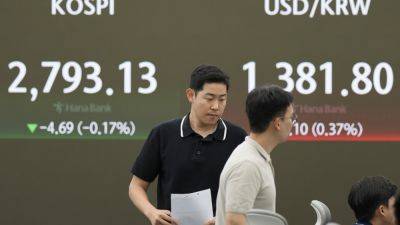Asia stocks mostly fall after cooler-than-expected Japan inflation data; yen nears 159 against dollar
Asia-Pacific markets mostly fell on Friday after Japan's May core inflation data came in slightly cooler than expected, jeopardizing the country's plans to raise interest rates.
The country's core inflation rate — which strips out prices of fresh food — came in at 2.5%. A Reuters poll of economists expected the May core inflation reading to come in at 2.6%, compared with April's 2.2%.
The so-called "core-core" inflation, which strips out prices of fresh food and energy, came in at 2.1%. This is lower than April's reading of 2.4%. The metric is considered by the Bank of Japan when formulating the country's monetary policy.
Japan's headline rate rose to 2.8%, higher than April's figure of 2.5%.
Japan's Nikkei 225 dipped 0.09%, ending the day at 38,596.47. The broad-based Topix dropped marginally to 2,724.69.
Softbank — the third heaviest weighted stock on the index — saw shares drop 3.14% after Softbank Group CEO Masayoshi Son said the company needed "immense capital" to develop AI robotics.
The yen weakened for a seventh straight day, declining to 158.95 against the U.S. dollar.
Japan's chief currency diplomat, Masato Kanda, said the government was ready to make a move against the volatile currency market that has hurt the economy, Reuters reported.
The U.S. Treasury Department placed Japan on its currency "Monitoring List," but did not classify it as a currency manipulator.
India's benchmark Nifty 50 index dropped 0.11%, after hitting a fresh record high earlier in the day.
HSBC flash Composite Purchasing Managers' Index for India rose to 60.9 in June from 60.5 in May. The data complied by S&P Global showed that growth was stronger at goods producers compared to service providers.
South Korea's Kospi fell 0.83%, finishing the day






